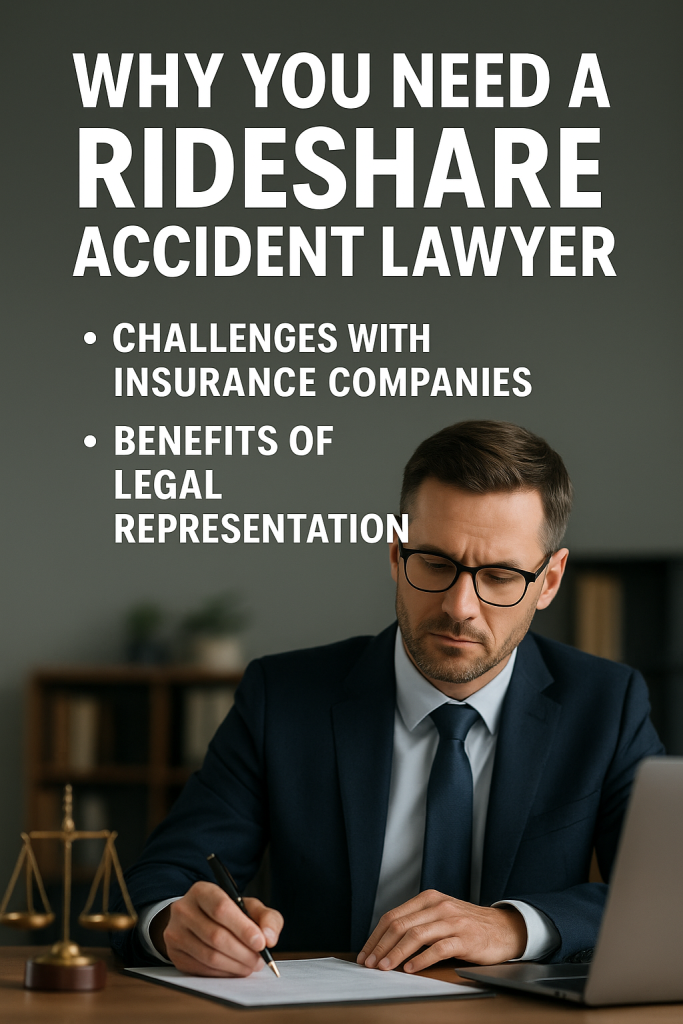Introduction
The rapid rise of Uber, Lyft, and other rideshare services has transformed how we travel—but it’s also created new challenges when accidents occur. Whether you’re a passenger, another driver, or even a pedestrian involved in a rideshare incident, navigating the legal maze can be complex. That’s where choosing the right rideshare accident lawyer becomes crucial.
In 2025, legal landscapes around rideshare liability continue to evolve. Companies frequently adjust their policies, states are modifying laws, and insurance coverage can vary drastically depending on whether the app was “on” during the crash. Without expert guidance, victims often find themselves trapped in a game of blame between insurers and tech companies.
This ultimate guide will walk you through every vital step—from understanding rideshare-specific accident laws to spotting the traits of a trustworthy attorney and preparing for your legal journey. If you’re searching for justice, clarity, or simply peace of mind, this article equips you with the tools to make confident legal choices in 2025.
Understanding Rideshare Accidents in 2025
What Makes Rideshare Accidents Unique?
Unlike traditional car accidents, rideshare incidents involve multiple layers of complexity due to the involvement of third-party platforms like Uber and Lyft. These companies operate on a hybrid model where their drivers are considered independent contractors, not direct employees. This distinction makes it more difficult to pin liability directly on the rideshare company unless very specific criteria are met.
Moreover, insurance coverage fluctuates based on the driver’s status at the time of the accident:
- App Off: Only the driver’s personal insurance applies.
- App On, No Passenger: Limited coverage by the rideshare company may apply.
- Passenger Onboard or Driver En Route: The highest tier of commercial insurance (up to $1M in liability) typically kicks in.
This layered liability system often leads to disputes about which insurer should cover the damages. Victims, meanwhile, can find themselves in legal limbo without proper representation.
Legal Implications for Drivers and Passengers
If you’re a passenger injured during a rideshare trip, you’re almost never at fault—but proving negligence (by the driver, another motorist, or even the company) is essential for a successful claim. A rideshare accident lawyer knows how to gather app data, phone logs, and GPS evidence to build a solid liability case.
If you’re a driver, whether you’re at fault or not, your case gets even more complex. You could be dealing with personal auto insurers denying claims because you were “working,” while the rideshare platform might minimize involvement to dodge liability. Navigating this grey area demands expert legal insight.
In 2025, as legal interpretations of these scenarios continue to evolve, working with an attorney who understands current trends, local laws, and the inner workings of tech-driven transport is not just useful—it’s critical.

Why You Need a Rideshare Accident Lawyer
Challenges with Insurance Companies
Dealing with insurance after a rideshare accident is rarely straightforward. Multiple parties may be involved, including:
- The rideshare driver’s personal insurer
- The rideshare company’s commercial insurance
- Other drivers’ insurance policies
- Your own auto or health insurance provider
Each insurer aims to protect its own interests—not yours. They may deny responsibility, delay claims, or offer settlements far below what you’re entitled to. Add to that the complexity of proving app activity status (off, waiting, en route, or transporting a passenger), and it’s easy to see how victims can be trapped in red tape.
A rideshare accident lawyer cuts through that complexity. They know how to compel companies to release driver data, pull mobile app logs, and challenge lowball insurance offers. Without their expertise, claimants are often at the mercy of adjusters skilled in negotiation tactics that undervalue or reject claims.
Benefits of Legal Representation
An experienced rideshare accident lawyer brings more than legal knowledge—they offer strategic power. Here’s what they bring to the table:
- Accurate claim valuation: They’ll ensure all damages—medical costs, lost wages, pain, and suffering—are included.
- Professional negotiation: Lawyers handle all insurer communications, preventing you from making statements that may hurt your case.
- Legal filings and deadlines: From submitting claims to initiating lawsuits, every detail and deadline is handled on time.
- Courtroom preparedness: If a fair settlement isn’t offered, a good lawyer is fully prepared to take the case to trial.
In many cases, having legal representation results in double—or even triple—the compensation compared to handling claims alone. Beyond the numbers, it’s about peace of mind. You can focus on recovery while your lawyer tackles the fight for justice.

Top Qualities to Look for in a Rideshare Accident Lawyer
Experience with Rideshare Claims
When you’re choosing legal representation, not just any personal injury lawyer will do. You need someone who specifically understands the intricacies of rideshare accident claims. These cases are governed by both traditional traffic laws and the rapidly evolving legal frameworks that govern app-based transportation platforms.
An ideal lawyer will have:
- A proven track record with Uber, Lyft, or other rideshare-related cases
- Familiarity with corporate insurance policies and how to challenge them
- Experience gathering digital evidence (like trip logs, app data, and dashcam footage)
- A strong understanding of local statutes and court precedents
Ask for examples of similar cases they’ve won or successfully settled. The more niche experience they have, the stronger your case will be.
Client Communication and Transparency
Nothing is more frustrating than being left in the dark while your legal future hangs in the balance. That’s why clear communication is a top quality to seek. A great lawyer won’t just talk at you—they’ll talk with you.
Key signs of an effective communicator include:
- Prompt responses to emails and phone calls
- Clear explanations without legal jargon
- Regular case updates without needing to chase them
- Honesty about the strengths and challenges of your case
In addition, transparency about fees is critical. Most rideshare accident lawyers work on a contingency basis, meaning they only get paid if you win. Still, you should understand exactly what percentage they’ll take, what additional costs might be involved, and how they handle settlements.
Look for a lawyer who is approachable, organized, and open—these traits often translate into how seriously they take your case and how effectively they will represent you.
How to Find the Best Rideshare Accident Lawyer in 2025
Online Research and Reviews
In today’s digital age, your first step to finding a reliable rideshare accident lawyer often starts online. A simple search like “best rideshare accident lawyer near me” can yield dozens of results, but how do you narrow them down?
Start by looking for:
- Google Reviews and star ratings
- Listings on Avvo, Martindale-Hubbell, or FindLaw
- Testimonials on the law firm’s website
- Mentions in local legal directories or “Best of” rankings
Read beyond the stars—what are clients saying about responsiveness, results, and how the attorney treated them throughout the process? A consistent pattern of positive feedback is a strong indicator of professionalism and client satisfaction.
It’s also worth checking their bar association credentials, verifying that they’re licensed and in good standing. Look out for any past disciplinary actions—this information is usually public.
Making the Most of Free Consultations
Most personal injury lawyers, including those who handle rideshare cases, offer a free initial consultation. Don’t waste it. Use this meeting to interview them just as they’ll assess your case.
Come prepared with questions such as:
- Have you handled cases involving Uber or Lyft accidents before?
- What’s your success rate for rideshare injury claims?
- How do you charge for your services?
- Will I be dealing with you directly or your associates?
Pay attention not just to their answers, but their tone. Are they engaged? Clear? Rushing? Do they show empathy? That gut feeling matters more than you think.
Lastly, don’t hesitate to consult multiple lawyers before making a decision. Choosing someone you feel confident and comfortable with can drastically impact the outcome of your case.
What to Expect During the Legal Process
Step-by-Step Breakdown of a Case
Knowing what lies ahead can ease your mind and help you make informed decisions. Here’s what typically happens once you hire a rideshare accident lawyer:
- Initial Consultation You’ll provide details about the accident, medical treatments, and interactions with insurance companies. The lawyer will assess the strengths of your case and outline next steps.
- Case Investigation Your attorney gathers critical evidence—rideshare app logs, police reports, medical records, surveillance footage, and witness testimonies. In some cases, they may collaborate with accident reconstruction experts.
- Demand Letter and Negotiation Once liability and damages are established, your lawyer sends a demand letter to the at-fault party’s insurer, requesting a specific compensation amount. This usually initiates a back-and-forth negotiation.
- Filing a Lawsuit (If Necessary) If the insurance company refuses a fair settlement, your lawyer will formally file a lawsuit and prepare for trial. This includes depositions, discovery, and pre-trial motions.
- Settlement or Trial Most cases are resolved through settlement before trial. If not, the case proceeds to court, where your lawyer presents evidence to secure a favorable verdict.
From Filing to Settlement or Trial
The timeline of a rideshare accident case can range from a few months to over a year, depending on:
- The complexity of the accident
- The number of parties involved
- Insurance cooperation
- Court schedules
An experienced lawyer will keep the process moving efficiently while protecting your best interests. They’ll also prepare you for what to expect—whether you’re testifying in court or submitting to a deposition.
Most importantly, they’ll fight to ensure every aspect of your loss is represented in the final compensation—medical bills, pain and suffering, lost income, and long-term rehabilitation.
Hiring the right lawyer doesn’t just increase your chances of winning—it ensures the experience is as smooth and stress-free as possible.











